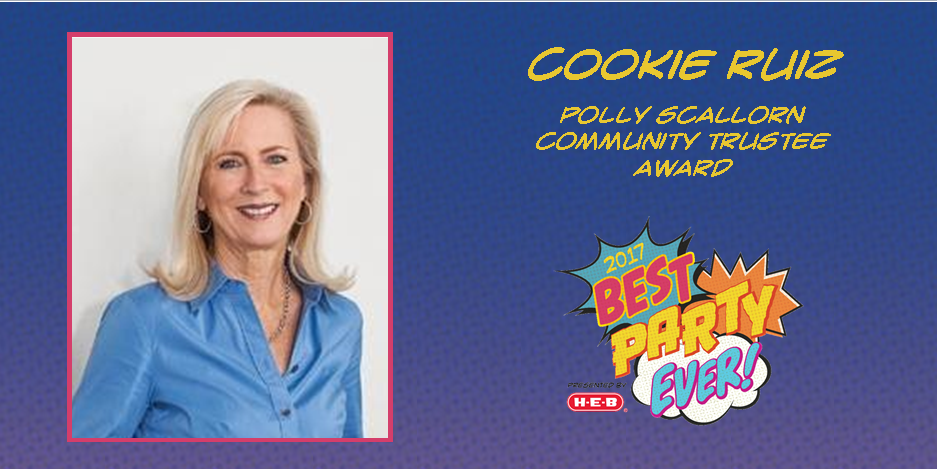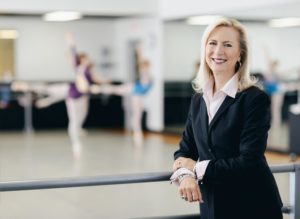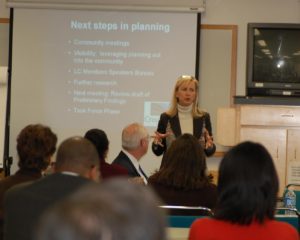
By: Elizabeth McGuire
Cookie Ruiz grew up a child of the world. The daughter of a U-2 pilot who flew high-altitude reconnaissance, she lived in remote locations all over the globe. That childhood gave Ruiz a sense of worldliness and connection that she still carries with her today as the leader of the 11th largest ballet company in the United States.
Ruiz became Executive Director of Ballet Austin in 1999 and has more than 30 years of experience in the areas of strategic planning, organizational development and non-profit fundraising/management.
 Throughout her career, Ruiz has garnered numerous community awards including Austin Business Journal’s “Profiles in Power” Award, Austin Community Foundation’s Beverly S. Sheffield Award for Excellence as a Nonprofit Executive, The American Red Cross “Clara Barton Medal of Honor,” Volunteer of the Year for the Austin Independent School District, the Lone Star Girl Scout Council “Women of Distinction” Award, and The Junior League of Austin’s Volunteer Extraordinaire Award. She is a 2016 Austin Arts Hall of Fame inductee.
Throughout her career, Ruiz has garnered numerous community awards including Austin Business Journal’s “Profiles in Power” Award, Austin Community Foundation’s Beverly S. Sheffield Award for Excellence as a Nonprofit Executive, The American Red Cross “Clara Barton Medal of Honor,” Volunteer of the Year for the Austin Independent School District, the Lone Star Girl Scout Council “Women of Distinction” Award, and The Junior League of Austin’s Volunteer Extraordinaire Award. She is a 2016 Austin Arts Hall of Fame inductee.
Ruiz served as the city-wide Chair of CreateAustin and as a City Council appointee to ImagineAustin’s Citizen’s Advisory Task Force. Ruiz is currently a member of the Board of Trustees and former national Chair of Dance/USA, the Board of Directors of the Performing Arts Alliance, Vice President of the Board of Directors of Texans for the Arts, the Board of Directors of the Mayor’s Better Austin Foundation, the Board of Directors of Housing Works Austin and is a member of the Austin Area Research Organization (AARO). She is also a Fellow of The National Arts Strategies International Chief Executive Program.
Ruiz is a graduate of the 1995 Leadership Austin Essential class and served four years on its Board of Directors. In June, Ruiz joins the ranks of other notable Austinites when she receives the Polly Scallorn Community Trustee Award. The award honors Essential alumni who exemplify the principles of community, inclusion, collaborative decision-making and personal responsibility over a lifetime of achievement.
Leadership Austin is thrilled to honor her with the Polly Scallorn Community Trustee Award at the upcoming Best Party Ever on Friday, June 2, 2017.
As a longtime Austinite, what do you think about our city’s growth?
Right outside my window is the Austonian, the tallest residential building west of the Mississippi. And right out back is the future Independent, which will soon surpass it. This one is 60 floors; that one will be 63.
I bought this piece of property as the agent of my organization in October 2002. September 11th had happened. Enron had just crashed. The Stock Market had just crashed. The troops were going to Afghanistan. And that’s the month that my poor Board of Directors said, “All those in favor of buying a warehouse four blocks west of anything cool in Austin, please raise your hand.” Now it looks like they were a brilliant real estate team, but at the time we were a 50-year-old organization that had never owned any property. For 10 years I ran our business out of four noncontiguous rentals.
We are really excited about the development and densification of our downtown, but it has made a big impact on our business. More than two years ago we decided we would start documenting this situation to give a picture of what it’s like for us. We want officials to see what it is like to be a small business impacted by development. We will probably turn it into a short film and then have educational tour with it—starting with the City Council. We love our city and love being part of an urban environment, but development is hard on business. There really is no advocate so we became our own advocates.
 What does Austin needs as a community?
What does Austin needs as a community?
As a city we’ve been quick and proud to brand ourselves to music and live music, which I think is great, but only if we are willing to understand that at the core of that supposition are musicians. Musicians who are not actually being paid as they should be paid. The idea that we could be the Live Music Capital of the World and we pay people out of a tip jar just doesn’t work. So there are some things where we have room to grow and develop.
There are a lot of entities working hard on behalf of musicians and creatives, but I’m worried about our ability to sustain that in terms of affordability. The actual working artist needs to be a part of the conversation.
Being an artist is not a get-rich scheme, but it’s also not appropriate to look at an artist and say, “Go get a real job.” That is really offensive. You talk to artists and somebody always wants to talk about their Plan B. Do you talk about a Plan B with a teacher or a firefighter or a nurse? What other career do you ask someone to go get a real job? So for me, as a non-artist working with artists, I feel strongly that our world has to include their voices because they can be unfettered and can challenge us to look at the world differently.
The core of my motivation is the journey of the 22 amazing dancers in our company. They are at the top of their game. A lot of our city doesn’t understand this. Dancers are recruited from a 30-city audition tour and videotapes from around the world. They move here. This is their livelihood. It’s an 8-to-5 job. They have medical insurance and a matching 401K. About 40 percent of our company are married to each other and 40 percent of our women are mothers.Twenty percent are mothers of more than one child. This is their profession. When they fill out their IRS form, they write “dancer.” They are at the level, in their industry, of an NFL or PGA player. They are world-class artists who also happen to be world-class athletes. We have 22 in a city that should have 2200 of them.
And I’m the person who is trying to raise their salaries. I’m so proud of what we do for our artists, but I want to do more. There is a tendency to dismiss organizations like us because of the patrons of arts. God bless them because without them we wouldn’t exist, but it’s actually the face of the artist that I’m trying to get people to see.
What makes a good leader?
I’m fascinated by the atypical leader. Not the charismatic leader who has a great personality and is a great spokesperson…but the leader who emerges from the middle of the group. This one leads without a focus on self and with a true understanding of team. There’s something about the sweat equity that goes along with that kind of leader. Those are the leaders to whom I’m drawn.
How has your leadership changed over time?
Today, more of my time is being spent as an advocate. Advocacy doesn’t work well when you’re doing something for yourself. Most often the work I’m doing is about an ecosystem…particularly our small and mid-size organizations. We struggled and we’ve had success. It’s our time to return the favor. I hope I’m the kind of person who builds a ladder behind herself, for the next person.
 How has Leadership Austin influenced the way you work?
How has Leadership Austin influenced the way you work?
Leadership Austin changed everything for me. There’s no other experience that I can think of that’s like it. There’s not going to be another time in your life when you’re with the most interesting group of people you’ve ever met—who you would never meet otherwise—who are carefully vetted for their differences in this very thoughtful, artistic way.
You are forcing yourself to set aside the time to deeply know people and learn about your city. It’s really easy to live your life not knowing about the city where you live. Leadership Austin literally changed the way I saw my city—not like I had it all wrong and now I had it all right—but it allowed me to evolve. You can’t know what you don’t know…and then knowing something, you can’t unknow it.
I also became a better listener. I talk for a living—it’s my career. Leadership Austin was a lot about listening and observing, and that has served me well. When things aren’t going as well as they should be going in my professional life…I go back into listening mode and I can see the path.
Advice for Austin emerging leaders?
I’m a little in love with millennials, and a lot of it has to do with their commitment to cause. When I’m working with mentees, one thing I talk about is developing early in their lives the ability to underpromise and overdeliver. Ultimately there is a brand of trust you have to establish as a leader.
If someone is going to give me a job or ask me to lead something, and I say yes…I need them to never have to think about that again. That’s how leaders are built: a project at a time, a month at a time…having what you say and what you do be tightly related.
Advice for experienced leaders?
This makes me think of my father, who is almost 97. I have so much to learn from him. Every day I just want more because there is so much wisdom there.
Ballet Austin’s Board has a tradition that I inherited, but I kept it going: it’s a requirement that there be as many board members under the age of 35 as over the age of 65. So age diversity is baked into our board. The youngest members are dying to talk to Sarah Butler and Terry Long…not because of their resources because of all the things they’ve done over the years.
I would love to see more ways to connect the very very young to the very very seasoned, because I think there’s a lot that can happen there.
Thoughts on receiving this award?
In my career, if I’m doing my job right, you shouldn’t see me. We are a performing arts organization so it’s about (Artistic Director) Stephen Mills and his work. So I’m getting the resources right and making all the hiccups go away, but if I’m doing my job, you shouldn’t be very aware that I’m there. Awards feel a little awkward, but truly at the same time I feel honored, grateful and appreciative.
###

